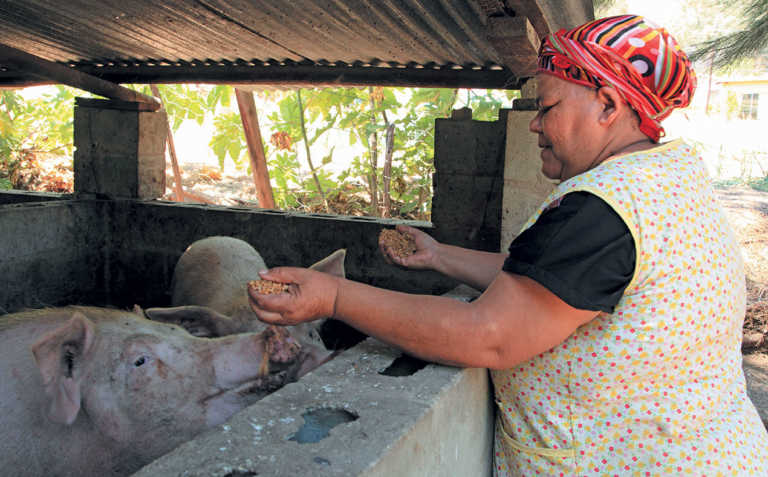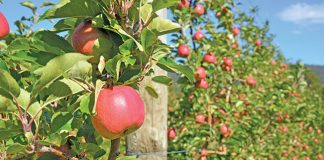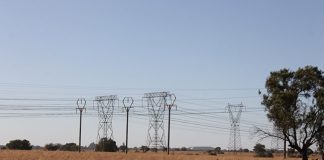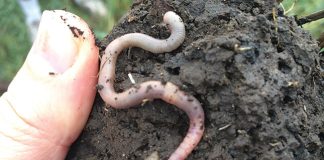
Photo: Glenneis Kriel
Setting up an average commercial pig operation with 1 000 sows is extremely expensive, requiring an investment of R80 000 to R100 000 per sow. However, this need not exclude smaller players from making a living out of pig farming.
Augusta Thomas, who farms on 3ha near Goedverwacht on the West Coast, started out with two piglets 20 years ago. Today, the single mother runs a 10-sow operation, which allows her to feed not only her own family, but also to provide for other community members.
READ Happy pigs make for good business
“Pig farming can be very lucrative if you produce a good-quality product and keep input costs low,” she says.
The simplest way to make money from pig production is by selling weaners to informal buyers for household consumption.
Augusta’s customers prefer gilts, as that obviates the need for castration to prevent boar taint (the bad odour and taste in pork from non-castrated pigs).
According to Augusta, a farmer with 10 sows can generate a turnover of about R169 000/year, assuming that each sow produces 26 piglets annually and these are sold for around R650 each.
“The piglets should be healthy, dewormed and weigh at least 15kg to 18kg if you
want to realise a good price. People are not going to pay for junk,” she warns.
The business can be even more profitable if pigs are finished off on-farm and sold to the formal market when they weigh between 60kg and 100kg.
“I try to finish at least half the piglets on the farm, but more often than not I have to sell the piglets earlier than I’d like because of cash flow problems,” says Augusta.
“The best I ever did was to get R12 000 for four sows.”
Supplying the formal market is not without its challenges. Production risks are significantly higher, as the pigs are kept on the farm for longer, costing more money in feed.
Transport costs are also higher, because the growers have to be transported to the market, whereas the weaners are generally fetched from the farm.
Good relations
According to Augusta, it is also difficult to establish a secure outlet as a new entrant with no formal structures and only small volumes.
“When you’re new to the game, it’s important to establish a good relationship with someone in the formal market,” she stresses. “It’s not good enough to talk to them over the phone. You need to meet that person face to face and establish a trust relationship. And they need to know you’re producing healthy pigs in a clean environment.”
Another challenge for new entrants is negotiating fair prices.
“I used to charge R350/weaner, until I heard that commercial farmers were selling them for twice as much,” recalls Augusta.
“Since then I’ve been keeping tabs on price movements by reading agricultural magazines and talking to other farmers. My price is derived from commercial prices; where a commercial farmer at the moment will realise about R750/weaner, I charge R650.”
Keeping the costs low
Feeding costs represent 60% to 80% of the variable cost of swine production, and can make or break a pig farming operation. As such, Augusta tries to keep her feeding costs at around 30% of her total production costs. She does this in two ways.
The first is by collecting free wheat screenings and hulls (by-products normally discarded) from a source in the Swartland. Her only cost is the transport for the 150km round trip.
To improve the digestibility of these by-products, she soaks them for 12 hours, then cooks them into a porridge.
Augusta’s second money-saving technique is to sell pig manure for R10 per 10kg-bag, or exchange it for fresh fruit and vegetable waste to add nutrients to the pigs’ diet.
“The quality of the waste is important, because rotten food may upset the pigs’ stomachs,” she notes.
It is also against the law to feed anything else but plant waste to pigs, as this represents a serious health threat, she adds.
Augusta rarely buys premixed feed, as it is so expensive. When she is financially better off, however, she purchases creep feed for the piglets.
She also buys the ingredients for a ration that she mixes herself, which consists of maize, wheat, molasses, soya bean, syrup and animal feed lime.
When carob pods are available, the molasses is replaced by carob molasses, made by mashing ground molasses with water to extract the sugar, and reducing and straining the liquid to form a thick syrup.
READ Basic infrastructure for small-scale pig farming
“Carob trees are in abundance here. Three grow next to my house and I harvest pods all the way to Piketberg and Porterville,” says Augusta.
The wheat porridge is fed to the pigs for a month and then alternated with the mixed ration for a further month.
“We don’t really have to feed the sows anything else, as the rations are well balanced,” she adds.
Each sow has access to a 5kg bucket of feed per day.
“The piglets nibble on the food while with the sows, so that those not sold as weaners make a good transition to solid food when they’re taken away from the sows at six weeks.”
Cleanliness is extremely important when raising pigs, not least because it prevents diseases.
“We thoroughly clean each pen once a week, and I clean the water and feeding buckets daily. With pig farming, you need to keep your eye on things; you can’t do it remotely.”
Future plans
Augusta does not want to over-invest in her business at present. Although her family has had access to the land for more than a century, it currently belongs to the Moravian Church and is now close to an urban area.
This limits Augusta’s pig herd to only 10 sows, making expansion and infrastructure upgrades impossible. As a result, she is in negotiations with the church to move the piggery 7km out of town.
“For example, I already have water nipples and the fittings, but don’t want to install them if I’m going to have to move the business,” she explains.
Augusta also dreams of starting her own abattoir.
“As a small-scale farmer, you really have it made when you have a secure outlet for your product and you can cash in on the entire value chain. I make my own pork sausages for home use, but I’m not allowed to sell the sausages, because the meat wasn’t prepared in an abattoir.”
Phone Augusta Thomas on 060 439 6739.
| Log on to Facebook to leave a comment below. |











